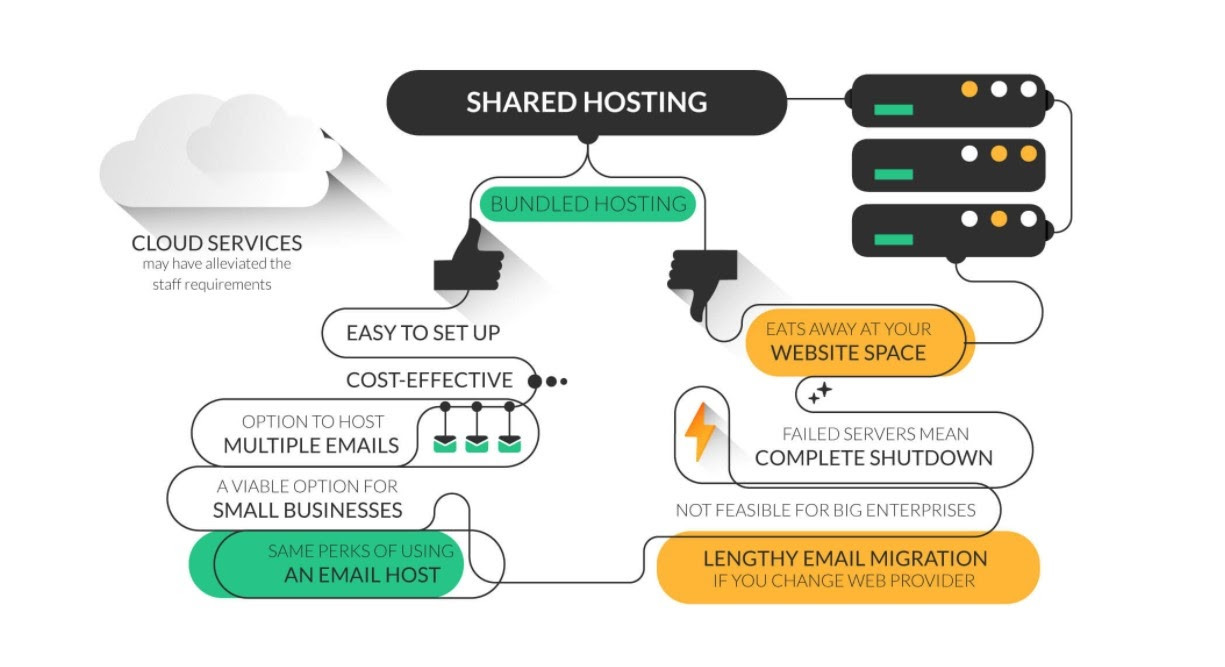As an entrepreneur, one of the many first things that come to mind is how to manage your company’s email. After all, email is an important method of business communication that is speedy, cheap, and easily accessible.
The benefits that emails bring to businesses are aplenty, as it provides efficient and effective ways to transmit all types of electronic data to communicate with the readers. Also, email marketing is one of the most cost-effective ways to bring in more revenue.
Email Hosting in a Nutshell
Email hosting encompasses a very broad spectrum. However, at the end of the day, it is typically a service that hosts the content of your email. Email hosting is similar to that of web hosting services. As such, it is no wonder that most web hosting providers offer email hosting along with their unlimited web hosting packages.
Most businesses prefer to use the same website and email host, aka bundled hosting as this is an easy way to get a wholesome and more efficient service. Exactly what's included in the offered package depends on each provider. Alternatively, you can turn to an email host to focus purely on optimizing your corporate emails.
Ways to Host Your Emails
Bundled Hosting (Email & Website)
Both the website and email hosting are two different services; they can run independently of each other. If you choose to create an email for your business, you will be able to run an email marketing campaign and make you look more professional. Bundled email hosting means you get email hosting with your web hosting account.
However, most bundled email hosting is limited in space and bandwidth. Additionally, if your web host suffers a breakdown in operations, your website and email will automatically shut down; you’ll get cut off from the world.
That said, bundled hosting has its share of benefits. It is more cost-effective as web hosts usually include email hosting as part of their package deals, thus being much cheaper. Also, it is easy to set up and get things running; you won’t need to manage your emails separately. You also get to have your email domain naming convention that fits your business name - more professional. When faced with the challenge of choosing a brand name or domain, feel free to utilize a business name generator. This tool provides a convenient solution for overcoming difficulties in the naming process, offering a wide range of creative suggestions to inspire and guide your decision-making. Whether you need a unique brand name or a memorable domain, the business name generator can assist you in finding the perfect fit for your business or website, saving you time and effort in the process.

Advantages and Disadvantages of Bundled Hosting (Source: HostPapa)
1. Shared Email Hosting
This occurs when the email accounts associated with a website are stored on the same server as the site. This comes with more restrictions; as such, it is cheaper. The number of email accounts and storage space is limited, as you’ll share with your website.
As a result, this option is more preferred by solo entrepreneurs and much smaller businesses. This is because their need for resources is not that intensive, and they won’t have the budget to invest in splitting the email and website hosting services between two providers.
You can check out the following plans:
InMotion Hosting
Their Lite plan comes with a free email address. However, you must upgrade to the higher plans if you need more email accounts. InMotion prides itself in its more than 99.95% server uptime record and its SpamExperts professional spam filter. You can also manage your emails without having to go through cPanel. Last but not least, you can access emails via IMAP/POP/Webmail.
TMD Hosting
TMD Hosting’s shared hosting plans allow you to create unlimited email accounts for your domain name(s). You manage your email accounts via cPanel > Mail > Email Accounts. You can explore their Starter plan at $2.95 a month.
All their shared hosting packages are fitted with spam protection for the associated email accounts completely free of charge - SpamExperts. TMD Hosting has high speeds and great uptime. Also, you can access emails via IMAP/POP/Webmail.
2. Cloud Email Hosting
Like other cloud-based services, using cloud-based email has many benefits: operational efficiency and reduced costs. There’s no physical equipment to maintain, and because you can add/remove resources by your needs at any time, you pay only for what you use.
As such, cloud email hosting is scalable, keeping your costs efficient, and your email performance would be much improved. You can use JMeter load testing, an enterprise-grade JMeter testing feature from a cloud-based load testing solution, to monitor your email performance at all times.
Suppose your company is a small and medium-sized enterprise (SME) with a limited budget. In that case, cloud email hosting is a good choice, as this is not only a safer and more secure option, it is available to you at an affordable price.
Dedicated Email Hosting
Another option is dedicated email hosting. This is more suited for those of you who need more enhanced email-related features. Take note that this does not mean you get an entire email server solely for your own use. It just means that the account is focused specifically on handling emails alone.
You get a fixed amount of space and bandwidth for your account that is separate from your web hosting. Also, you get more functions and advanced features. Of course, to get these goodies, you’ll have to dig deeper into your pockets. Despite the more advanced features in play, this option is still easy to set up.
Dedicated email hosting is more suited for larger businesses that require more intensive resources.
You can check out the following plans:
Hostinger
Hostinger’s Professional Email Hosting plans have ten email addresses with many rich and useful features. Hostinger has a solid hosting performance with more than 99.98% uptime. It has both bundled and dedicated email hosting options at very competitive pricing. Each plan offers multi-device support, anti-virus, and anti-spam checks.
The dedicated hosting service uses the Flockmail web client that offers integrated calendaring to organize and set schedules. Also, it is equipped with video call invites (host meetings for up to 50 people), and its interface is mobile-friendly.
All in all, the Hostinger email hosting plans are deemed the best budget email hosting option available as they offer simplicity yet usability for a very affordable price.
LiquidWeb
Suppose you need something more extensive. In that case, LiquidWeb offers Premium Business Email Hosting, a fully managed service where you can access your email from anywhere via mobile, webmail, and mail clients. You won’t have to worry about the hassle of continuous updates and maintenance required for your emails, as LiquidWeb handles everything for you.
Take note that you’ll need to purchase one of their hosting services to enjoy this business email service. Their plans start from $2.00/month/user.
Enterprise Solutions (SaaS)
Software as a service (SaaS) is trending nowadays. It is one of the three main categories of cloud computing and is a software distribution model in which a cloud provider hosts applications and makes them accessible to any internet-connected device.
Email-focused hosting providers such as Google and Microsoft have email hosting solutions such as Google Workspace and Microsoft 365 Business; these are powerful dedicated email services that are managed separately from your hosting even if they can use your domain name.
Microsoft 365 Business Premium
This is typically all of Office plus email. Office 365 is now known as Microsoft 365 which typically consists of all Office desktop apps, all Office online apps, Microsoft Teams, all the benefits of Exchange, calendaring, mobile apps, and so many more.

Microsoft 365 is a commonly-used enterprise-scale office solution. (Image source: Microsoft)
Microsoft 365 Business Premium includes all features you need from a hosted email service, along with the Office apps. With a single subscription, you get hosted email and web, desktop, and mobile access to Microsoft's other tools. As such, if your organization heavily uses multiple Microsoft apps, this could be the best email hosting choice for you.
This plan is specifically built for businesses with under 300 users.
Google Workspace (G Suite)
An enterprise-level Gmail, Google Workspace is Google’s alternative to Microsoft 365. It successfully integrates email hosting with Google’s other wide variety of communication and collaboration tools. So, everything you need to get anything done, are all now in one place.

G Suite has been re-branded as Google Workspace (Image source: Google)
Productivity apps such as Gmail, Calendar, Hangouts for messaging and voice/video conferencing, Drive for shared cloud file storage, Google Slides, Docs, Sheets, Slides, Meet, and more are included.
If your company focuses a lot on using cloud-based tools, Workspace could be it for your email hosting. Unfortunately, Workspace’s non-enterprise plans do not have unlimited storage (G Suite was compelling in the past because of its offered unlimited storage).
That said, Workspace still appeals and does a great job of email management and thus is the best email hosting service for simplicity and keeping everything on the cloud.
Hosting on Your Own
This is an option that not many would lean towards as this involves you owning, setting up, configuring, and maintaining your email servers and infrastructure onsite at your office premise. However, the more massive conglomerates could opt for this for reasons specific to them.
Pros
Hosting your own email would mean that the email server is totally under your control. As such, you get to take advantage of the flexibility and extra privacy provided. You’re no longer dependent on other third-party providers because everything remains under your supervision.
All information is private and under your wings. Your customization possibilities are almost infinite. Simply put, you’re in the driver’s seat. Also, you’ll get a faster response from a team that is working under and with you.
Cons
Email servers are complex as they consist of many software components with their respective functions. Each must be configured correctly so that they can work together at the optimum level so that you get a fully functioning mail server.
Designing and setting up your own email server is not straightforward and can be very time-consuming. The same applies to securing your emails. Email security encompasses various procedures and techniques for protecting email accounts, content, and communication against unauthorized access or compromise.
Don’t forget that maintenance of email servers can be very nerve-wracking and time-consuming too; this includes consistently keeping your antivirus and spam filtering rules up to date, all software regularly updated, and others.
Last but not least, hosting your own email means you’ll have to undertake the expense of the hardware which includes investing in other utility requirements, typically the whole infrastructure to support hosting your emails as an organization. You may also need to increase the bandwidth which means a higher budget is required.
How to Choose a Good Email Hosting?
What makes good email hosting is typically similar to what makes good web hosting. Let’s look at some of the important criteria:
Reliability and Flexibility
Your web host will be hosting both your website and emails. As such, they need to have good and reliable uptime. Imagine if your web host is often down, both your corporate sites along with emails (communication with the outside world) will be gone. This will certainly tarnish your company’s image and reputation, not to mention killing your business too.
As such, always look for a web host that is reputable and has a good track record.
Security
A client’s impression of you and your business is crucial. Your client must have trust in the integrity of your business in order to do business with you. They need to be assured that you’re serious about your business. One of the ways is to assure your clients that you’re deploying all the necessary security features to ensure your email security is top-notch.
When you do so, they'll be more likely to entrust you with information that is confidential and be more willing to transact with you. This extends to your website security too. Therefore, ensure that your provider has in place all the necessary and relevant security features such as spam filtering, malware scanning, data encryption, secure email protocols (such as SSL/TLS), and continuous cloud scanning for potential threats.
Accessibility
You’d want to access your emails at all times via various platforms. As such, you need to look for an email hosting provider that allows you access to webmail, POP, and IMAP. Having the flexibility of using a web-based email makes it more convenient as you can literally access it anywhere, anytime as long as you have an internet connection.
While IMAP allows you to access your emails from any device without having to download them, POP requires you to download your emails before reading them.
Free of Any Blacklists
Never get in a situation where your IP address gets blacklisted as this only spells disaster for your business. Also, it takes a significant amount of time and effort to get your IP cleared. All this translates to total business disruption = disaster. As such, do your due diligence and only go for highly reputable and trusted email hosts.
Should You Host Your Own Email?
Many business owners struggle with this question. They don’t know what is the best approach when it comes to managing their company email. Although there are numerous options available, there are too many that knowing where to begin can be a challenge. That said, it can be done.
The answer to the question above is a simple and straightforward yes! Business email hosting would be the way to go for most businesses and the reasons are as below:
Professionalism & Build Trust
Hosting your own emails would mean getting a custom domain for your emails - [email protected]. What do you think goes through your clients’ heads when they receive emails from your company using [email protected] instead? First and foremost, you’ll look totally unprofessional - any Tom, Dick, or Harry can register this email at no cost to them.
Your clients will start having question marks on the legitimacy of your company with some doubting if you’re serious about your business. Others would even believe that this is one of those fly-by-night companies that won’t be around in the long run. As a result, your clients will ignore you.
However, if you use a custom domain [email protected], you’re giving more confidence and assurance to your clients that they know exactly who they’re dealing with. This is because those who mean the business would be more willing to invest time, money, and effort into getting a domain-specific email to represent their business.
The [email protected] is unique and specific to you alone. Using a business email also creates a more professional image of your brand and shows dedication to your business. This helps you get a competitive advantage over the rest. Your clients will recognize your business as trustworthy, which is the crucial step to leading a successful business.
Stops Your Emails from Going into Spam Filters
It is no point putting so much effort into your emails if they don’t reach your client’s inboxes. So, if you use free email services, your sent emails might be shown as spam; all your time and effort would be down the drain.
However, if you opt for business email hosting, your emails won’t get bounced or fall into spam folders. You can be assured that your emails will reach your clients.
Data Security
To ensure a successful business, you must secure both your business and the interests of your customers and their data. As such, all essential security measures need to be in place. Free email services usually come with a catch and thus can put your business at high risk, making your business vulnerable.
However, if you host your own business emails, you can make sure that all safe best practices are implemented to secure your emails and related data. Furthermore, the security features offered by the web hosts are aplenty and tightly in place.
Support
Businesses that host their own business emails can rest easier, knowing that emails with crucial information are handled better and safely at all times. If you choose to host your emails, you’ll be in a better position to deal with unexpected incidents that could arise from email issues.
This is because the given support that comes along with business email hosting could help heaps in ensuring no disruption to your business.
Conclusion
Generally speaking, you should host your own email as the benefits of doing so are aplenty. However, there’s no hard and fast rule when it comes to hosting your emails. There are certain guidelines that you can look into to help you move in the right direction though.
If you’re a solo entrepreneur, going for shared email hosting would be a good start - easy to set up, manage, and is cheap. If you’re an SME, you can consider cloud email hosting as it gives you the flexibility to scale up as and when you need it at a more affordable price.
And if your company has a huge business with a bigger budget, dedicated email hosting may be the way for you as this provides you with more focused handling of your emails, separate from your web hosting and also you get more advanced email features.
You can also consider Google Workspace or Microsoft 365, depending on whether your company is more tied to the Google or Microsoft ecosystem. We hope the above helps set things clearer for you to make a more well-informed decision when it comes to your business emails.




![Best Email Campaigns to Inspire You [2025]](https://ik.imagekit.io/debounce/wp-content/uploads/2022/12/best-email-campagin-designs-300x139.png)
![Best WP Plugins for Email Marketing [2025]](https://ik.imagekit.io/debounce/wp-content/uploads/2022/05/email-marketing-plugins-300x139.png)
